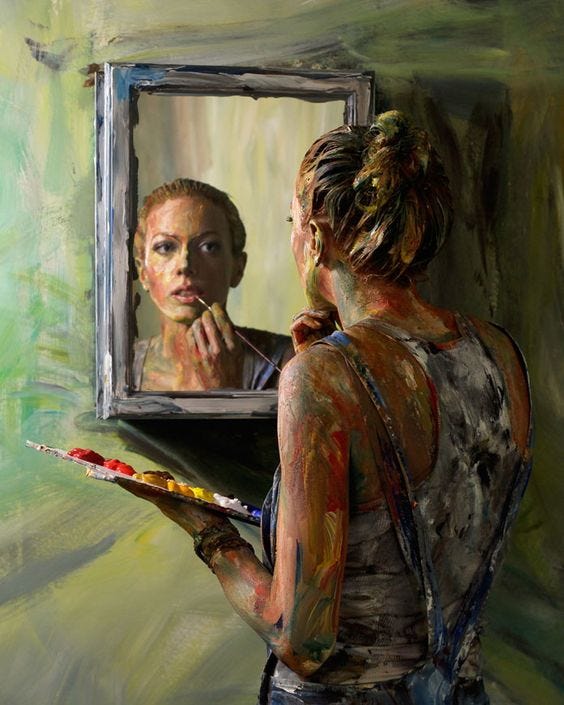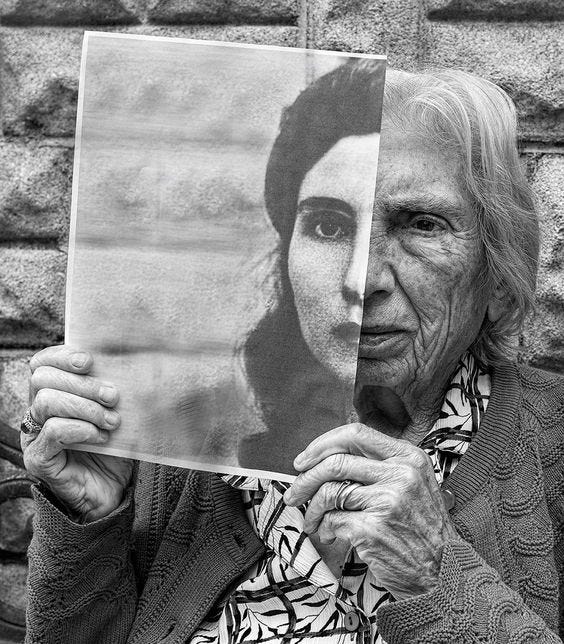A Dive Into Memory: An Integral Part in What Makes You, You
An exploration of how memory works, how it gives us our past and points us to our future
Portrait by Alexa Meade on display at The Untitled Space Art Show
Take a moment and find a space where you can fully focus on this moment. Imagine you're in front of a grand mirror, one you would see in a castle—gratuitous and larger than life-larger than you. Who do you see when you look into the mirror? Who are you?
What images come to mind when you think of your identity?
What traits?
Does a picture of yourself come to mind?
Now dig a little deeper. Where did that trait, that image, that person, where did they come from?
For me, the first thing that comes to mind is the word caring. It's an integral part of my personality, whether I like it or not. It brings to mind my memories of volunteering, and goes allll the way back to when I was little little. I was sitting outside with my best friend, concrete scratching against my legs as I tried to convince her that I could be the best tutor.
She was struggling to understand our math homework, scared-scared as an 8-year-old could be- about what would happen to her grade. All I can remember is itching to help. I wasn't good at math, it was my worst subject. But just maybe, putting our two heads together could make us understand.
I'm caring, and I have so many memories to base that trait in—along with everything else that makes up my identity. Who I am, is all cemented in who I was.
Our unique memory gives us the opportunity to build an identity, a vision.
How Does Memory Work?
We have two different types of memory: working memory and long-term memory.
But first, let's dive into the process of a moment becoming a memory.
The process of information becoming a memory takes place in three stages: encoding, storage, and retrieval.
Encoding
There's a bit of a language barrier between you and your brain. While you see things through your senses, visual information, the brain “sees” things through a series of electrical impulses fired between neurons.
So when you first see, let's say a really good looking apple, the brain needs time to encode that info into their language. Encoding happens in a few different ways, mirroring our senses! So, it could translate that you saw an awesome apple based off of:
its sound, I bet the apple has a crisp crunch when I bite into it.
its touch, the apple feels small yet firm in my hand.
its look, damn it looks like a really good apple.
its meaning, my grandma really liked apples.
How you experience it, might not be how you remember it. The process of encoding is why you recall last Christmas when you see a pine tree. It's the first step in the process that aids to the stepping stones of memory, and without it, the language barrier of the brain would have blocked any chance of memory from the start.
Picture shot by Tony Luciani
Storage
Step #2 is where working memory and long-term memory come in. Working memory-also referred to as short term memory- will hold information for up to thirty seconds.
If the brain decides it's important (it's more complicated than that, but works for our purposes), then the information is encoded and goes on to long-term memory for up to infinity.
Retrieval - What Makes Us Uniquely Human
Step #3, which I'm sure you may have heard of before, is recall. It's how in our first exercise, when I recalled who I am, the trait of caring came forward, and with it came a memory.
I brought a memory forward into my working memory, from the mariana trench of long term. It makes us uniquely self-aware. Without the ability to retrieve information and manipulate it with new data, we couldn't have culture, language, innovation.
Above all, we wouldn't have a sense of ourselves.
Now that we know the process of memory, we can trace the steps of our identity.
Identity through the Lens of Memory
“Identity cannot be found or fabricated, but emerges from within” - Doug Cooper
Think back to the exercise we did at the beginning of this article.
What traits or memories came up? What meaning does that bring for you?
caring loving stubborn
kind determined
If it's just one or many, these traits, these memories, have built you into the person you are today. The good and the bad. The happy and the sad. They've all brought you to the masterpiece you are.
From the past, we are given our present.
It can be seen in how you react to stress, what your interests are, what we're doing now.
And, it can show us our future.
Memory: The Prophet of Your Future
Imagine you're standing in between two paths. One path is covered in brush, only the unnatural direction of the tall grass signaling it's somewhere you could go. On the other side is a true path born from years of footsteps leaving behind a dirt road.
Painted by Michael Robles
The memories that have made us, guide us to the path most traveled. After all, we've walked down similar roads before. Our past, our values, our personality all brought to us by memory influence our choices. We'll most likely choose the road that follows our habits and interests. The path most trodden is the most you path right?
It doesn't have to be.
You Are the Captain of Your Soul
Yes, memory does have a strong hold on us. It is the beholder of our past and the bright colored sign showing where our future can and should go. But none of us our perfect. We have bad habits, bad memories, bad traits. We don't want to follow the path that's most easy sometimes.
So, if you have the time and the will, sit down with me.
Set a timer for five minutes.
Answer the age old question, where do you want to be in 5 years?
Based on who you are now and your habits, will you get there?
What might need to change?
How Can I apply This Moving Forward?
Follow what you need to change, and make it an achievable goal! If what you need to change is your bad sleeping habits, don't make that goal: "Tomorrow and forever, I'm going to wake up at 5:30 AM”. That's not achieveable. Try babysteps like: “I'll set my phone further away from my bed”.
Want to learn more about memory? For this post, I mostly pulled from an informative Harvard article about memory. Feel free to check it out!
Want to learn more about creating a vision? Check out this TED Talk and how helpful visions can be as a tool.
I hope everyone enjoyed this little dive into memory. It was fun to write and learn about! I'm thinking about doing a memory series in the future, following the steps of learning and climbing out of bad habits, but I have to finish a few other projects first!
There will be two posts out today! This post which went up at 9:30 AM EST, and a Spotlight on Reedsy and Writing Schedules, which will go up 12 hours later at 9:30 PM.
Thanks for reading, it means so much to me.
Until next teatime,
Kate








lovely article. I loved the paintings in between as well.